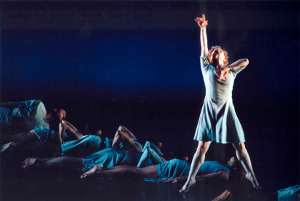If you love dramatic, vital opera performances, firmly welded to superb singing, spare no effort to secure a ticket to one of the remaining four performances of Don Giovanni by Wolfgang Amadeus Mozart (1787-1826), staged by North Carolina Opera. The venue, the A.J. Fletcher Opera Theater, is the perfect size for performances of baroque and classical operas since it does not require the stentorian voices needed for vast modern opera houses nor for voices that soar over thickly-scored Romantic operas such as those of Richard Wagner and Richard Strauss.
The NC Opera has set the benchmark high with this run of Don Giovanni, having spared no needed element. The costumes on loan, designed by John Pascoe for the Michigan Opera Theatre, are so rich and varied that they are almost worth the price of admission alone. The easily moveable set and scenery, originally designed by Erhard Rom and also on loan, make for smooth and fluid transitions between scenes. The lighting, designed by Tláloc Lopéz-Watermann, is imaginative and kaleidoscopic. The pit orchestra consists of some of the finest musicians from orchestras across the state along with free-lancers under the alert baton of Timothy Myers, who also accompanied recitatives on the harpsichord. Coordination between the pit and the stage was perfect.
Our state has not lacked for fine, professional performances of Mozart’s Don Giovanni, but director Crystal Manich has set a new standard in the depth of attention to telling performance details. For example, in Scene 2, Donna Elvira arrives with a full complement of servants. During her exchange with Don Giovanni and Leporello, the servants are just visible in the background with just enough “stage business” to be convincing (not static extras) without drawing attention to themselves. Members of the excellent chorus and extras acted as stage hands, seamlessly sliding large architectural elements to and fro. All the main characters were fully fleshed out and convincing. The drama flowed so uninterruptedly that I double-checked my libretto at intermission to verify there had been no cuts.
But opera is about singing and, if you are lucky, strong and vivid characterization. This richness the NC Opera has in spades with a wonderful cast of young, rising singer-actors in firm fresh voices.
Manich has created a marvelous ensemble cast. Bass Adam Lau as Leporello has a flexible, rich, and solid voice and a real flair for comedy. Bass-baritone Jeongcheol Cha, a recent graduate with an Artist Diploma from the Juilliard School, brought out all the self-centeredness of Don Giovanni. His full warm tone was deployed with great skill and intelligence. All the big arias were hit out of the park. A telling moment is in Scene 3, just before the start of his duet with Zerlina. Cha refined his dynamics to a ppp as he tried to seduce the peasant maid.
The role of Donna Anna’s fiancé, Don Ottavio, is one of the most thankless in all of opera – he is so passive in an Age of Duels and Revenge writ large. Tenor David Blalock brought a pleasing tone and firm voice to the role, delivering an excellent “Il mio tresor” in Act II and summoning more near-machismo there than is usual in performances. Baritone David Weigel sang robustly, making for a more-threatening-than-usual Masetto, as he grew more and more resentful of Don Giovanni’s advances upon Zerlina. Yet he scaled his voice back in the loving couple’s making-up scene. There was plenty of sepulchral depth to the bass of Benjamin LeClair as the Commendatorre, Donna Anna’s father. Reverberation added electronically made all-the-more threatening his ghostly visit to Don Giovanni in the penultimate scene of the opera.
Soprano Alexandra Loutsion brought plenty of power to the role of the ravished daughter of the murdered Commendatore. It was beautifully controlled across its range and Loutsion used it with great intelligence. All the coloratura was vividly in place as soprano Hailey Clark railed against her seducer Don Giovanni. She was believable in rage and as the all-too-susceptible woman. Soprano Jennifer Cherest brought more complexity than usual to the role of Zerlina, the too-susceptible peasant maid. Her warm and focused tone was a constant pleasure.
“Buy North Carolina” is a theme of the state’s Department of Agriculture, and “Buy Locally” is a motto in the restaurant business. It was a pleasure to note several NC connections within the Don Giovanni cast. Clark is an NC native and a 2009 winner of the Charles Lynam National Vocal Competition. Blalock received his undergraduate degree from the University of North Carolina at Greensboro in 2009, where he performed roles in The Ballad of Baby Doe and The Tender Land in which CVNC reviewed him. Weigel is a native of Asheville, NC, who received his Master of Music from UNC-G and his Professional Artist Certificate from the A.J. Fletcher Opera Institute in Winston-Salem, NC.
For information about repeat performances, see the sidebar.












